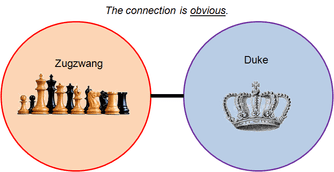|
Hardcore fanatics of the game of chess such as myself will recognize the term zugzwang, which is when one is forced to make a move that is unsatisfactory. Little do these connoisseurs know that the word has royal origins. Zugzwang comes from its German cognate, literally meaning "compulsion to move". This comes from Old German ziohan, meaning "to pull", because yo move a piece you would pull it. Ziohan comes from Proto-Germanic teuhan, which in turn comes from PIE deuk, or "to lead", because those who lead pull their armies in to battle and whatnot. Hold up! Does deuk sound familiar? It should; it's the progenitor of today's word duke, a division of royalty (like earl and viceroy, et cetera). In Late Latin ducere meant "to lead", just like the PIE word, and from it spawned the word dux, meanig "leader or commander", which makes sense if you think about it, since leaders and commanders obviously lead their armies, "pulling" them into battle. The word dux later became the French word for "prince" duc, which later passed into English. Therefore the words duke and zugzwang, which only have one letter in common and completely different definitions, are etymologically correlated.
2 Comments
5/9/2022 10:35:35 am
What an exquisite article! Your post is very helpful right now. Thank you for sharing this informative one.
Reply
Leave a Reply. |
AUTHORHello! I'm Adam Aleksic. I have a linguistics degree from Harvard University, where I co-founded the Harvard Undergraduate Linguistics Society and wrote my thesis on Serbo-Croatian language policy. In addition to etymology, I also really enjoy traveling, trivia, philosophy, board games, conlanging, and art history.
Archives
December 2023
TAGS |



